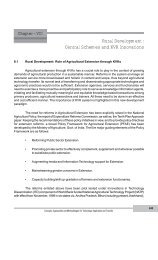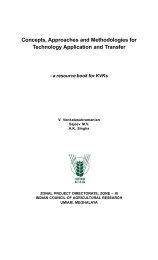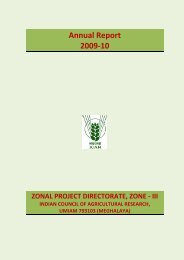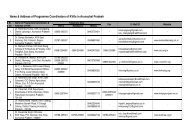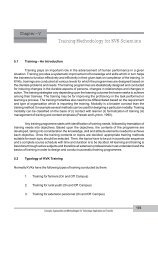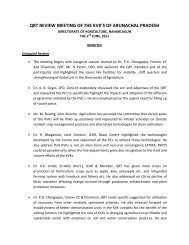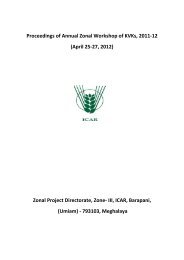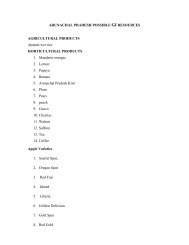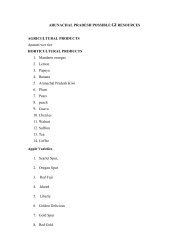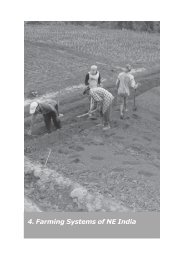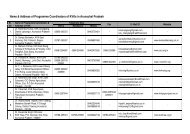Sajeev M.V, V. Venkatasubramanian & A.K. SinghaScience and technologyInvestments in agricultural science and technology have expanded rapidly during the last four decades.During this period, major technical and institutional reforms occurred, which shaped the pattern oftechnology development and dissemination. In the early 1970s, the Consultative Group on InternationalAgricultural Research (CGIAR) was established and National Agricultural Research <strong>Systems</strong> (NARS)were greatly strengthened. During the 1980s and 1990s partnerships among CGIAR centres and NARSwere established, including the eco-regional consortia. During the past decade, however, many NARShave been under budget pressure as macro-economic reforms were implemented.The historical focus of research by CGIAR and NARS centres on food crop production technologies, withits emphasis on improved yielding varieties, has undeniably been successful. Nearly three-quarters (71percent) of production growth since 1961 have been due to yield increases. Increased yields havecontributed to greater food security within developing regions and have contributed to declining realprices for food grains. It is significant that FAO projections to 2030 (FAO 2000a) indicate a continuingrise in average cereal yields in developing countries, under both rainfed and irrigated conditions.However, many poor smallholder farmers in marginal areas have not benefited from these cereal yieldincreases, and investments in technology development for non-cereal crops have usually received alow priority. Although the private sector and large farmers’ organizations have invested heavily inresearch for commercially important cash crops - examples include coffee, tea, sugar cane and bananas- many tropical staples and minor cash crops have received relatively little attention. Similarly, investmentin livestock research has generally not been commensurate with the contribution of the sub-sector tohousehold income or Gross Agricultural Domestic Product (GADP). Only one CGIAR research centre -the International Livestock Research Institute (ILRI) - concentrates on livestock, although other centreshave animal production programmes. In contrast, agricultural research in industrialized countries hasbeen relatively well funded with some of the work being led by the private sector. Consequently, a muchgreater range of new technologies is available for production systems and crops of interest to developedcountries than for smallholder production systems in developing countries.Overall, research has been focused principally upon intensifying crop and livestock production, usuallyby means of purchased inputs. There has been far less research on integrated technologies for diversifyingthe livelihoods of small farmers in developing countries and increasing the sustainability of land use.Little is understood, for instance, about the role of organic matter in soils, the development of reducedtillage systems, the use of on-farm organic resources in combination with inorganic fertilizers and therole of legumes in biological nitrogen fixation. Similarly, there has been limited research in IntegratedPest Management (IPM) and in weed and pest control. These are topics of little interest to the privatesector, but also ones which are in danger of neglect by public research institutions.Despite these weaknesses, the global research agenda is gradually moving from a focus on individualcrop performance to a growing acceptance of the importance of increased system productivity. This isviewed largely in terms of better-managed interactions among diversified farm enterprises, sustainableresource management, and improved targeting of technologies towards women farmers and poorerhouseholds. Perhaps even more importantly in the long term, institutional modalities are now shifting.<strong>Farming</strong> <strong>Systems</strong> of North East India15
Sajeev M.V, V. Venkatasubramanian & A.K. SinghaFrom a public sector focus, largely led by the international system, more emphasis is now beinggiven to public-private partnerships driven mainly by the demands of clients. These changes arebeing accompanied by a growing understanding of farmers’ problems and opportunities and agreater willingness to blend indigenous knowledge and modern information.Growing investments in biotechnology are likely to increase agricultural research productivity and havethe potential to revolutionize production practices through the generation of customized crop varieties.Whilst there has been a gradual decrease in national and international public funding available foragricultural research and extension systems, private sector biotechnology research has attracted amplesupport, although not generally for tropical food crops. Most of this research is likely to focus on profitgeneratinginputs, export crops and agro-processing.Trade liberalization and market developmentOf the broad and all-encompassing processes included under the term globalization, the emphasis inthis document is placed on economic reform and trade liberalization. By the end of the 1970s, theeconomies of many developing countries had become highly distorted as a result of excessive governmentintervention and control. Most were in serious economic difficulties, with high inflation, unmanageablebalance of payments and fiscal deficits, high external debt ratios and Gross Domestic Product (GDP)growth rates that were negative or failing to match the rate of population increase. To address theseproblems, the International Monetary Fund (IMF), and subsequently the World Bank and otherinternational institutions and bilateral donors, initiated lending programmes under which balance ofpayments support was provided to a range of developing countries conditional upon the adoption ofprogrammes of structural reform. These Structural Adjustment Programmes (SAPs) have resulted inliberalized trade and exchange rate regimes and radically reduced subsidies in many developing countries.Structural adjustment, however, has not eliminated the urban bias in policies.Many SAPs have embodied reforms specific to the agricultural sector. These include measures to: (i)end marketing monopolies; (ii) reduce parastatal involvement in the supply of inputs, marketing andprocessing; (iii) reduce or remove subsidies, price controls and impediments to private sector activities;(iv) remove restraints on foreign trade; and (v) promote the private sector. Small-scale activities,requiring limited management, technical knowledge and with limited capital requirements, have beenrapidly adopted. The most notable is grain milling. In many countries, the marketing of grains has beenthe first major agricultural service to be privatised, due to the prior existence of parallel markets andbecause grain marketing boards have imposed major financial burdens on governments.More recently, international agreements and the establishment of the World Trade Organization (WTO)have further boosted trade liberalisation. Markets have a critical role to play in agricultural development,as they form the linkages between farm, rural and urban economies upon which the developmentprocesses outlined by Mellor (see above) depend. As a result of the reduction of impediments tointernational trade and investment, the process of trade liberalization is already generating changes inthe structure of production at all levels - including smallholder-farming systems in many developingcountries. Not only is market development accelerating, but patterns of production and natural resourceusage are also changing profoundly in response to market forces. The speed of change engendered bythis transition has, however, also had important negative effects. Poverty increased, at least temporarily,16<strong>Farming</strong> <strong>Systems</strong> of North East India
- Page 3 and 4: We sincerely acknowledge theconstan
- Page 5 and 6: PREFACEFarming System Research/Exte
- Page 7 and 8: 2. Methodology2.1.0 Selection of Di
- Page 9 and 10: 4.2.3 Farming Systems of Darrang 41
- Page 11 and 12: 5.3.3 Research priorities and strat
- Page 13 and 14: 6.6 Development strategies for Naga
- Page 15 and 16: Blank Page
- Page 17 and 18: Sajeev M.V, V. Venkatasubramanian &
- Page 19 and 20: Sajeev M.V, V. Venkatasubramanian &
- Page 21 and 22: Sajeev M.V, V. Venkatasubramanian &
- Page 23 and 24: Sajeev M.V, V. Venkatasubramanian &
- Page 25 and 26: Sajeev M.V, V. Venkatasubramanian &
- Page 27 and 28: Sajeev M.V, V. Venkatasubramanian &
- Page 29: Sajeev M.V, V. Venkatasubramanian &
- Page 33 and 34: Sajeev M.V, V. Venkatasubramanian &
- Page 35 and 36: Sajeev M.V, V. Venkatasubramanian &
- Page 37 and 38: Sajeev M.V, V. Venkatasubramanian &
- Page 39 and 40: Sajeev M.V, V. Venkatasubramanian &
- Page 41 and 42: Sajeev M.V, V. Venkatasubramanian &
- Page 43 and 44: Sajeev M.V, V. Venkatasubramanian &
- Page 45: Sajeev M.V, V. Venkatasubramanian &



